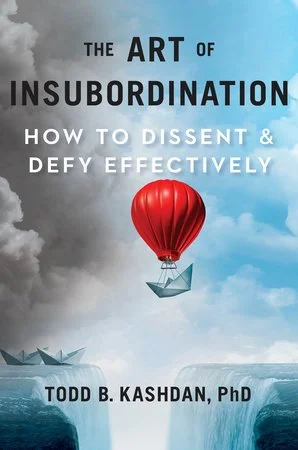Dare to Un-Lead: Collectively Changing Leadership
Celine Schillinger's new book, "Dare to Un-Lead: the Art of Relational Leadership in a Fragmented World," comes out today. The well-research book examines why we need new approaches to leadership and suggests that we collectively transform leadership through the concepts of liberty, equality, and fraternity.
The days of hierarchical, hero-worshipping, superficial "employee engagement" leadership don't fit our times or our souls. This is the age of collective action, for better or for worse. Celine explores how to cultivate corporate activism and new leadership approaches "for better" at work.
What I especially like are her stories of applying these new concepts to achieve business goals inside large, global companies, sometimes successfully, sometimes not so much. Theory is easy. Making it work is hard.
Here are some of my book highlights:
The old era of organizational management is over. We need new ways to lead.
How do we usher in new leadership approaches? Celine suggests we collectively transform leadership using the concepts of liberty, equality, and fraternity.
Leadership is a collective experience, not an individual hero's journey
Leadership follows a curious mathematical rule: the more you share it, the bigger it grows.
Citing Marshall Ganz on how organizing is synonymous with leadership: “Organizing is not about solving a company’s problems or advocating on its behalf. It is about enabling the people with the problem to mobilize their own resources to solve it (and keep it solved.)”
Beware new rigid models and rules
“Project teams, Agile methodologies, enterprise social networks, holacracy, design thinking, process redesign, and self-management all have their advocates. Each can have a positive effect where the whole company is mobilized. However, when good intent becomes a formula – a set of rules – people can’t apply – that’s when its positive effect stops.”
Self-emancipation and rebellion are necessary
“Rebellion is the fundamental reality of our lives because it creates the human community. From a small gesture of personal emancipation (liberty), there follows the purposeful connection of many (equality). From that point, there is progression to activist communities leading change, doing our best work together (fraternity.)
On navigating and protecting yourself as a change agent/ Rebel at Work
· Stop asking for permission
· Realize you have more power than you think.
· Find the purpose no one can disagree with
· Find friends, have fun.
· Map, identify, network, lobby.
· Shine outside (the organization)
· Involve external stakeholders.
· Search for impact.
· Claim big success, even if it’s still a work in progress.
· Cultivate bravery.
· Empower others.
· Be faultless with ethics and compliance.
· Learn, learn, and learn.
· Deliver results. Out-love everyone else.
Lead with liberty
"Liberty at work is the unconditional possibility given to workers to hold and express an independent judgment on the matter of their organization, to avoid managerial arbitrariness, and to direct their work so that it not only produces value but contributes to their dignity as human beings."
Corporate activism is the way forward
"I believe that activism and corporate leadership can be combined, for the benefit of all.
"Corporate activism as I practice it is a new leadership strategy that places the methods, tools, and practices of social movements in the service of the organization’s purpose. This is about creating the conditions that encourage an activist mindset and way of work.
"For an activist mindset to take root and flourish in an organization, a certain type of purpose is required: one that triggers action and that is identified and defined collectively. It must be neither too close nor too distant from the organization’s business goals, and it should be situated in time and attached to a specific window of opportunity."
Tragic and still urgent: get rid of the bully leaders
“His rhetoric was a mixture of Latin quotes to look smart, corporate-speak to look strategic, and macho obscenities to fit in with other alpha males. To give such people positions of influence, social status, and elevated income is scandalous.” (Reminds me of I comment I often make after listening to many alpha leaders: "He's always certain, but not always right.")



